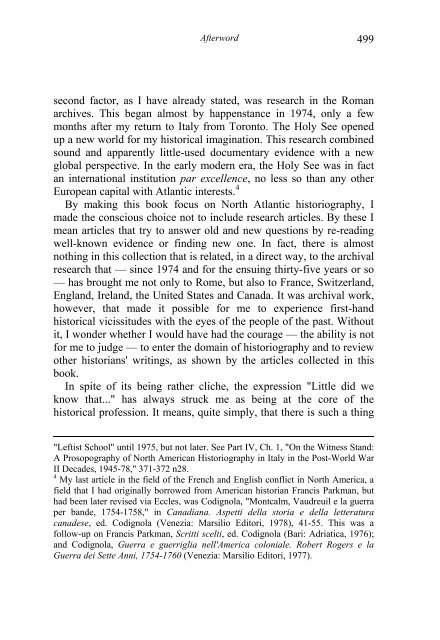Untitled - Istituto di Storia dell'Europa Mediterranea - Cnr
Untitled - Istituto di Storia dell'Europa Mediterranea - Cnr
Untitled - Istituto di Storia dell'Europa Mediterranea - Cnr
Create successful ePaper yourself
Turn your PDF publications into a flip-book with our unique Google optimized e-Paper software.
Afterword<br />
499<br />
second factor, as I have already stated, was research in the Roman<br />
archives. This began almost by happenstance in 1974, only a few<br />
months after my return to Italy from Toronto. The Holy See opened<br />
up a new world for my historical imagination. This research combined<br />
sound and apparently little-used documentary evidence with a new<br />
global perspective. In the early modern era, the Holy See was in fact<br />
an international institution par excellence, no less so than any other<br />
European capital with Atlantic interests. 4<br />
By making this book focus on North Atlantic historiography, I<br />
made the conscious choice not to include research articles. By these I<br />
mean articles that try to answer old and new questions by re-rea<strong>di</strong>ng<br />
well-known evidence or fin<strong>di</strong>ng new one. In fact, there is almost<br />
nothing in this collection that is related, in a <strong>di</strong>rect way, to the archival<br />
research that –– since 1974 and for the ensuing thirty-five years or so<br />
–– has brought me not only to Rome, but also to France, Switzerland,<br />
England, Ireland, the United States and Canada. It was archival work,<br />
however, that made it possible for me to experience first-hand<br />
historical vicissitudes with the eyes of the people of the past. Without<br />
it, I wonder whether I would have had the courage –– the ability is not<br />
for me to judge –– to enter the domain of historiography and to review<br />
other historians' writings, as shown by the articles collected in this<br />
book.<br />
In spite of its being rather cliche, the expression "Little <strong>di</strong>d we<br />
know that..." has always struck me as being at the core of the<br />
historical profession. It means, quite simply, that there is such a thing<br />
"Leftist School" until 1975, but not later. See Part IV, Ch. 1, "On the Witness Stand:<br />
A Prosopography of North American Historiography in Italy in the Post-World War<br />
II Decades, 1945-78," 371-372 n28.<br />
4 My last article in the field of the French and English conflict in North America, a<br />
field that I had originally borrowed from American historian Francis Parkman, but<br />
had been later revised via Eccles, was Co<strong>di</strong>gnola, "Montcalm, Vaudreuil e la guerra<br />
per bande, 1754-1758," in Cana<strong>di</strong>ana. Aspetti della storia e della letteratura<br />
canadese, ed. Co<strong>di</strong>gnola (Venezia: Marsilio E<strong>di</strong>tori, 1978), 41-55. This was a<br />
follow-up on Francis Parkman, Scritti scelti, ed. Co<strong>di</strong>gnola (Bari: Adriatica, 1976);<br />
and Co<strong>di</strong>gnola, Guerra e guerriglia nell'America coloniale. Robert Rogers e la<br />
Guerra dei Sette Anni, 1754-1760 (Venezia: Marsilio E<strong>di</strong>tori, 1977).


